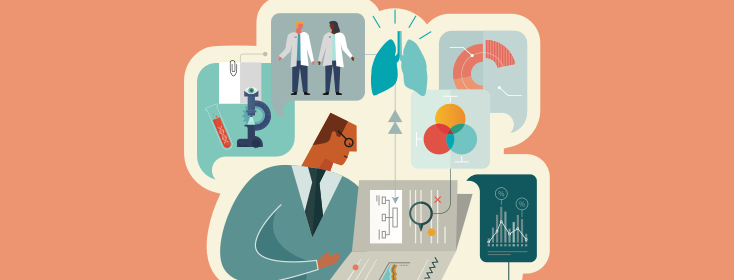Tips for the Newly Diagnosed
Newly diagnosed patients often feel like they are on a raft in the middle of the ocean without a paddle, surrounded by sharks. There are so many questions when hit with an unexpected diagnosis like lung cancer.
Below are a few of my top suggestions for the newly diagnosed and even for those of us who have been on this journey for some time.
Do not believe statistics
I think this is my first line of advice to someone who has just been diagnosed with lung cancer. The stats are dismal. But, there are several things to remember about statistics. First of all, they are old. They are no longer accurate.
Secondly, they are not about you. You do not know where on the bell curve you will personally fall. When I was diagnosed nearly six years ago, my husband was told I would probably live about four months. My oncologist didn't know that I was one of those who fell on the "plus side" of that bell curve. None of us know where on the spectrum we are. So, my advice to you is to live until you can't. Don't worry about what statistics say. They are not about you.
Second opinions are okay
This is a biggie. You are, quite literally, putting your life in the hands of your oncology team. I read posts from people all of the time who are questioning the treatment plan or the advice they were given by their doctor. I'm not saying it is wrong to ask for the opinions of others, but when you lose trust in your doctor-patient team, it might be time to think about changing doctors. At the very least, if you aren't sure that the treatment plan the oncologist has suggested is the right one for you, seek a second opinion.
Don't worry about whether your oncologist will get hurt feelings if you ask for another oncologist's ideas. First, it is your life we're talking about. If your oncologist does get his or her feelings hurt, so what? No one cares about you as much as you care about you. If a second (or third or fourth) opinion will make you feel more comfortable with the treatment plan, it doesn't matter if anyone's feelings are hurt.
Secondly, in most cases, oncologists welcome the feedback from their colleagues. Can you imagine how stressful it is to know that your decisions can potentially mean the difference between life and death for a patient? Knowing that a respected colleague agrees with your plan might be reassuring for your oncologist. And, if the second opinion differs from what your doctor recommended, you will be able to find out why each oncologist made the recommendations they did and decide which course of action makes the most sense to you.
Remember, you are a big part of the team
All too often, doctors and patients forget that they are a team. A lot of doctors are accustomed to making decisions without much feedback from their patients. And, patients are just as prone to accept letting the doctor make all of the decisions.
I would implore every patient to do research, watch Webinars, and talk to others who are in treatment. In other words, learn as much as you can about your disease and about the treatments that are working for others. Be informed.
Before making a decision on a treatment plan, you should know how long the treatment will last, what the most common side effects are, what ways are available to mitigate side effects, whether the side effects will be long- or short-term, and what alternatives there are to that particular treatment.
Live your life, not your cancer
It might not be easy at first, but it is important not to let your cancer consume your life. You are not your cancer. As much as possible, continue to live life. What does that mean? It might mean that you continue working, develop new hobbies and/or continue with old ones. Read books, watch interesting shows and movies, go hiking, get out in nature, visit with friends and family, do anything that isn't cancer-related.
The important thing is, don't quit living just because you got a lung cancer diagnosis.

Join the conversation